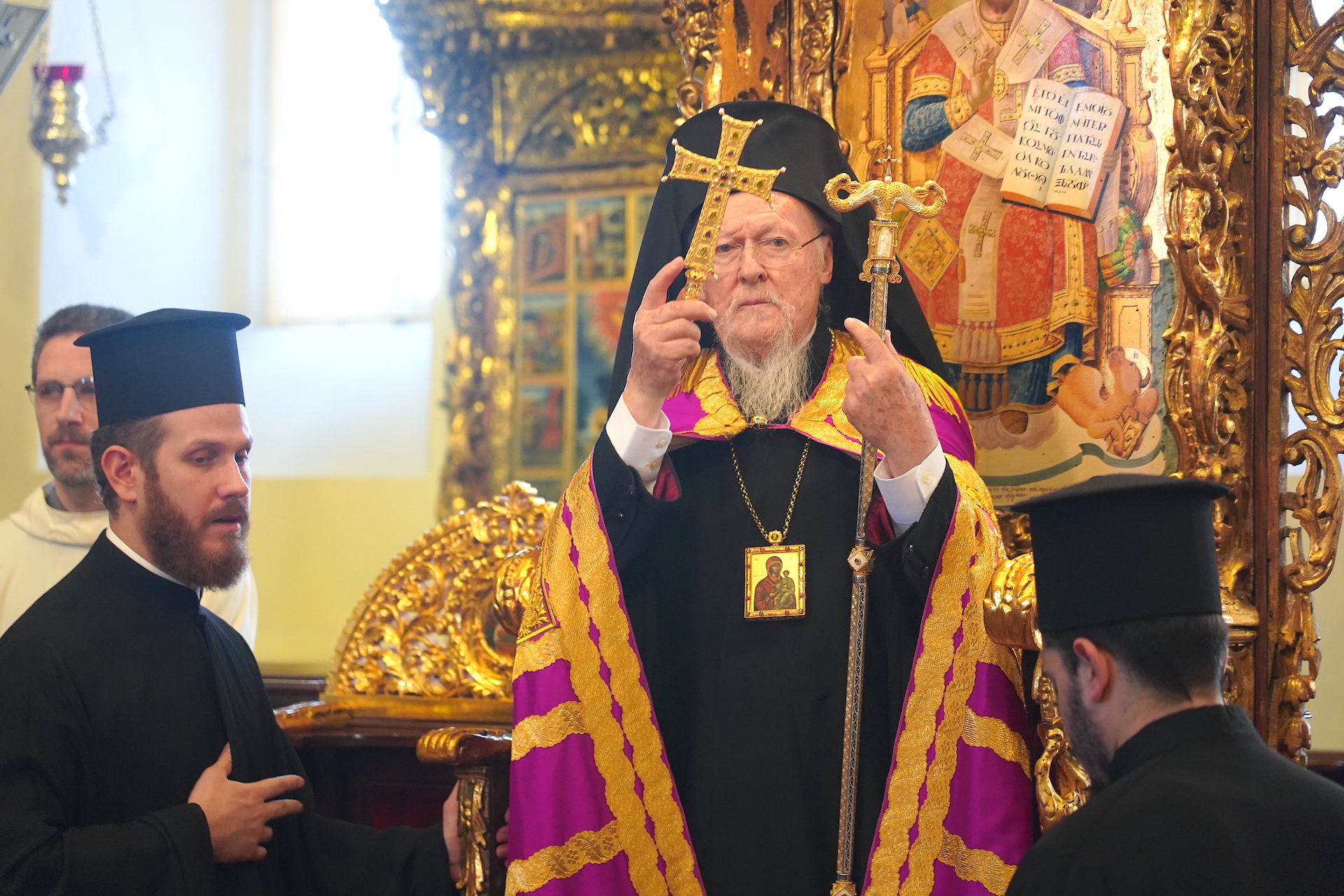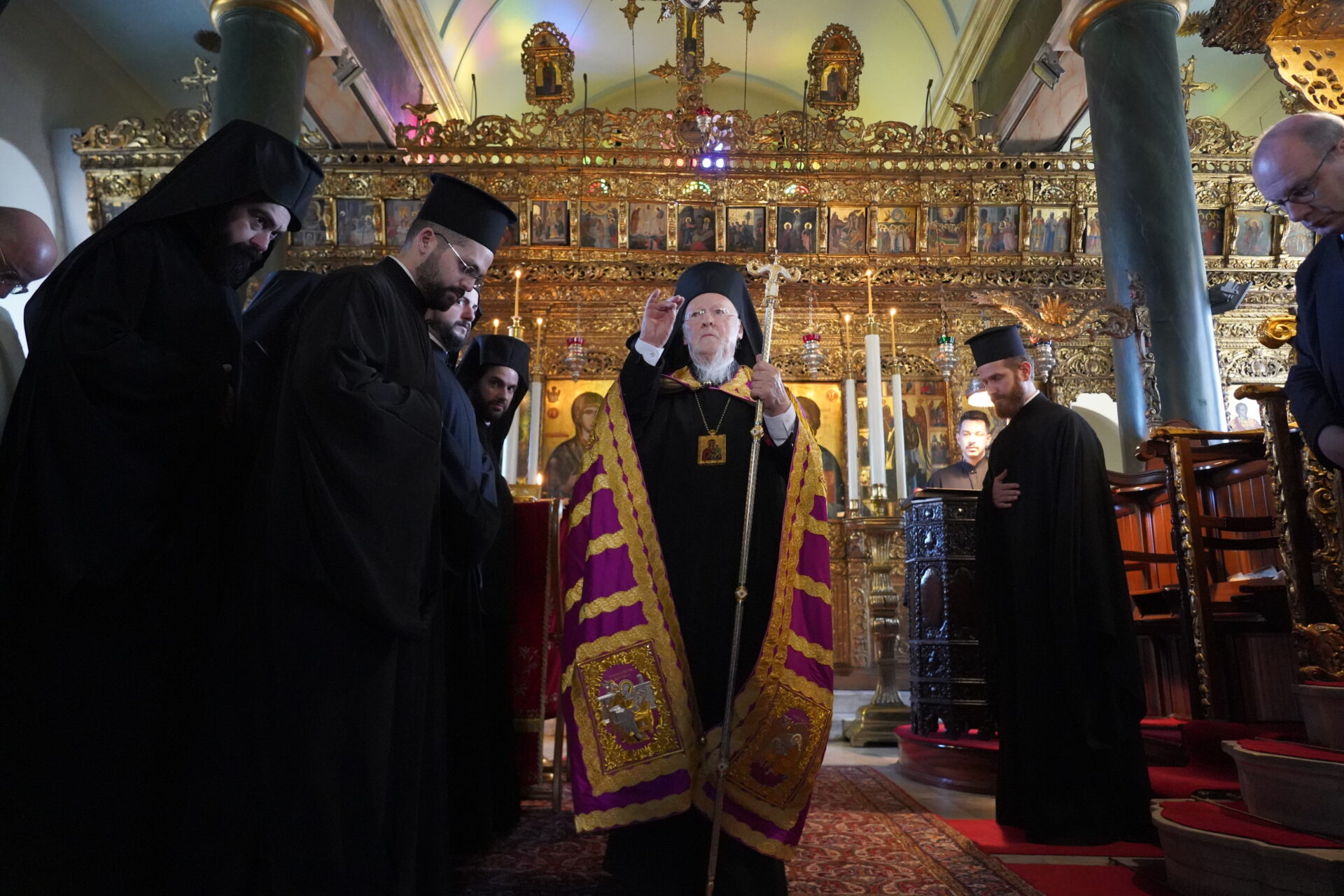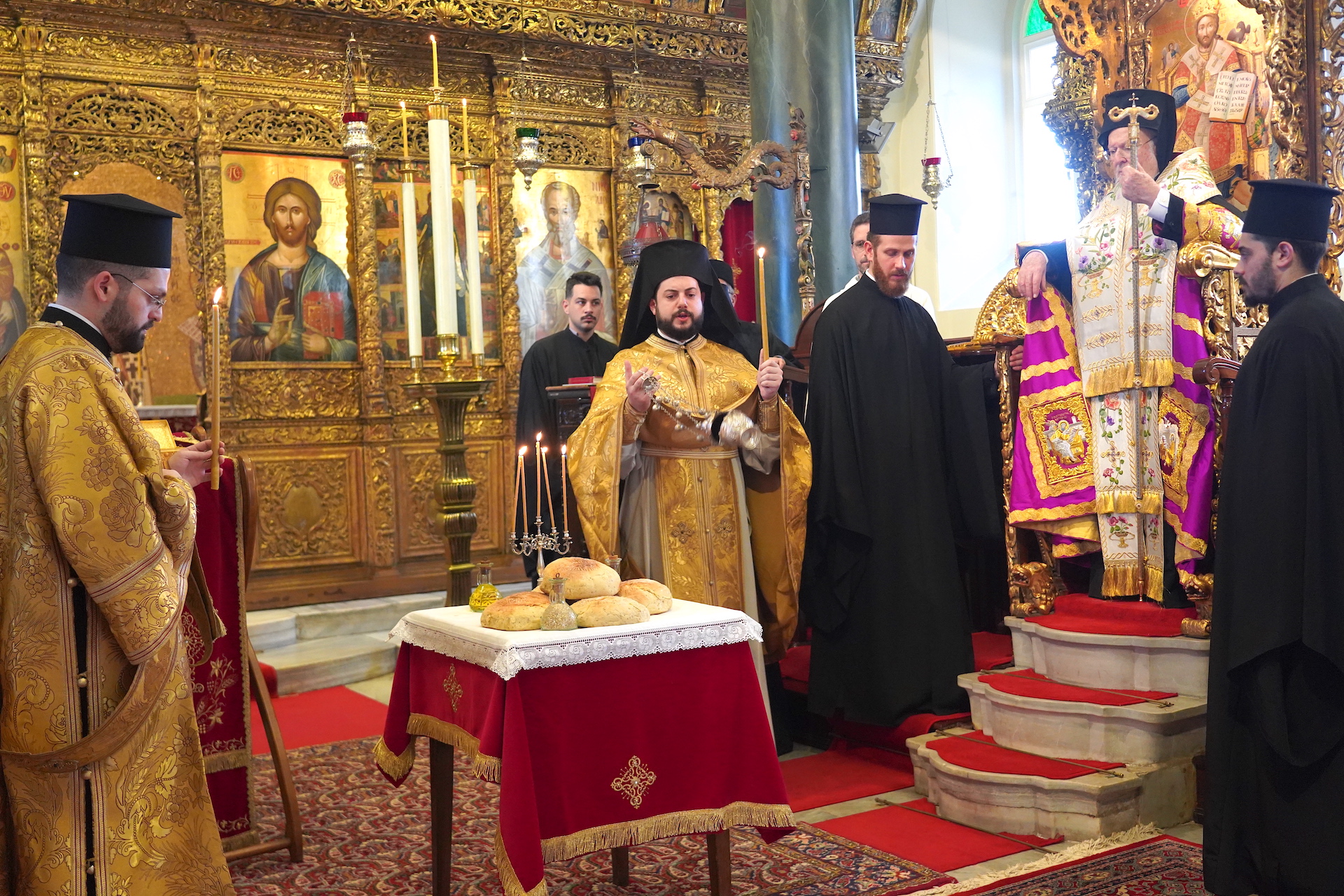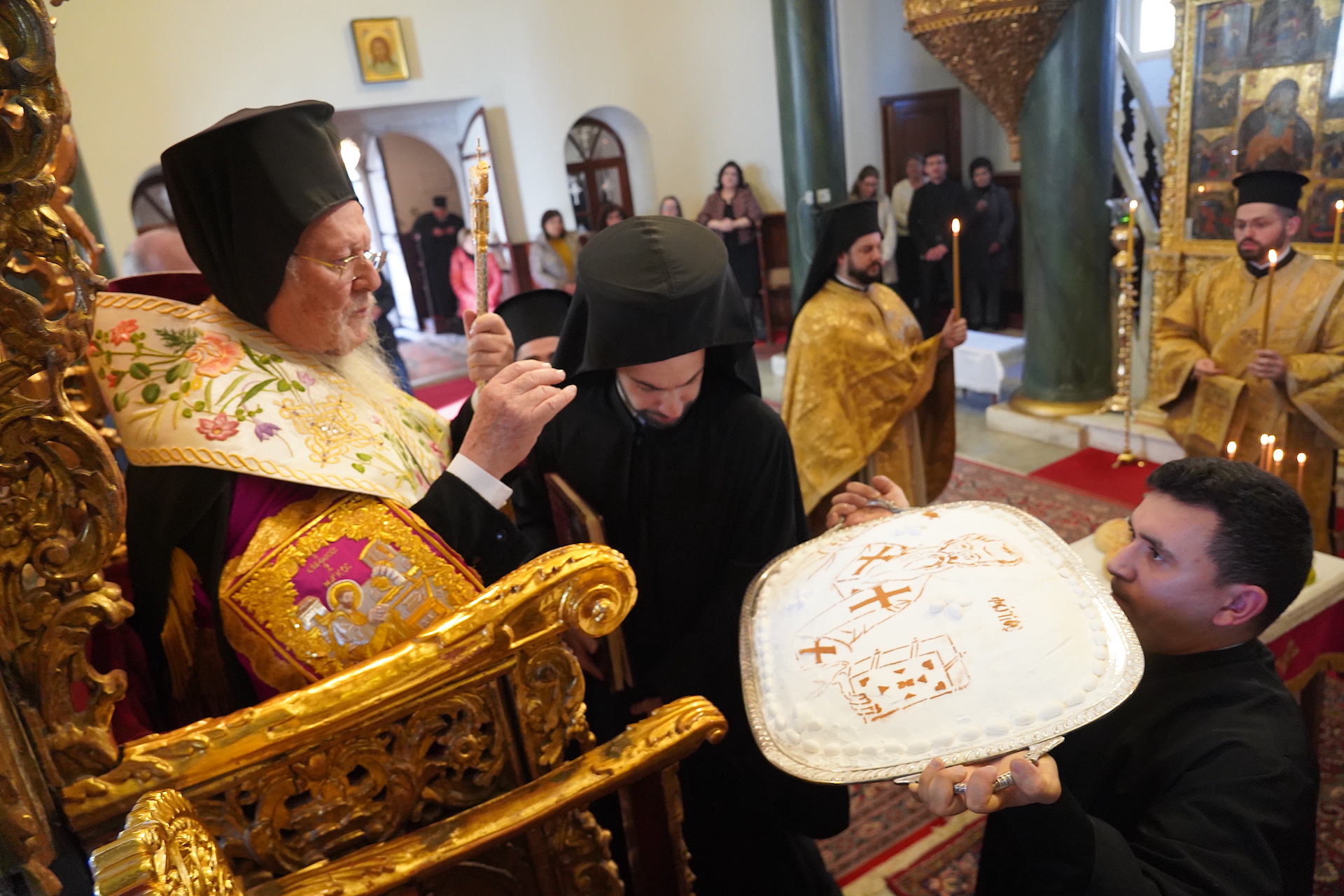The Ecumenical Patriarch on the great contribution of the Theological School of Halki to Orthodoxy

On Tuesday, 6 February 2024, His All-Holiness Ecumenical Patriarch Bartholomew officiated during the Divine Liturgy which took place on the occasion of the memory of Saint Photios the Great, Patriarch of Constantinople and co-founder of the Monastery of The Holy Trinity of Halki, in its Katholikon.
Present also for the feast day where Their Eminences, Elder Metropolitan Apostolos of Derkoi, President of the Ephorate of the Holy Monastery, Elder Metropolitan Dimitrios of Princes’ Islands, Metropolitan Nektarios of Anthidon, Commissioner of the Holy Sepulchre in Constantinople, Metropolitan Maximos of Selyvria and Metropolitan Andreas of Forty Churches, members of the Ephorate of the Holy Monastery, as well as His Grace Bishop Smaragdos of Daphnusia, clergy and monks, Lord Archons of the Ecumenical Patriarchate, and Ms. Julie Eadeh, Consul General of the USA in Constantinople.
Also present were Father Sabino Chialà, Abbot of the Roman Catholic Monastery of Bose, with members of his Brotherhood, Professors Mr. Christoph Markschies, President of the Berlin-Brandenburg Academy of Sciences and Humanities, formerly of the Prussian Academy, and Mr. Gerald Haug, President of the Leopoldian German National Academy of Sciences.
His All-Holiness, in the speech he made, immediately afterwards, in the Ceremony Hall of the Holy Theological School of Halki, recalled that it operated from 1844 to 1971, giving to the Great Church, but also to global Orthodoxy and the Christian world, more than 900 graduates, who ministered as Bishops, clergy, and teachers, “giving the good witness of faith, love and hope, with unwavering loyalty to the tradition of the Church and with sensibility for human kind, and for its earthly and heavenly destiny”.

“The Theological School of Halki”, the Patriarch emphasised, “was the “theological workshop”, the iron theological arm and the “think tank” of the Phanar, the institution which offered the most highly capable workers”. And he continued:
“Its faculty was called to express opinions on ecclesiastical matters, to prepare draft texts and recommendations of the Throne for canonical and liturgical matters, for Orthodox and inter-Christian relations. All the teachers and students of Halki School, recognise that the holy mission of the Church is not promoted under an introverted piety and theology, which is indifferent to the world or rejects it, in order to preserve unscathed the purity of the Orthodox faith, allegedly threatened by developments. Closed-off spirituality is the monophysitising denial of the universality of the Christian Gospel, which always produces fundamentalism.
This spirit of openness was preserved and cultivated during the last five decades in Halki. The closed School has functioned as a study centre, as a place for workshops and international conferences, various cultural events and other initiatives, as a modern “Academy”. More generally, it is true that without this spirit of dialogue, which the Holy Great Church of Christ embodies and expresses practically and universally, the presence and course of Orthodoxy in the modern world would be completely different”.
At another point in his address, the Patriarch referred extensively to the celebrated and honoured Saint Photios the Great, pointing out, among other things, that “he combined in his person Greek education with the Orthodoxy of faith. With his multidimensional presence and activity in the field of politics and culture, in education and in the ecclesiastical and spiritual areas, he had a decisive influence on the historical course of Byzantium, on the rebirth and flourishing of Greek Education and on the formation of the individuality of Orthodoxy”.
As he said, “Saint Photios was foremost a profound theologian, in whom the philological and philosophical training and the ancient Greek heritage functioned as a valuable tool for the emergence of theology as the “highest education”. His contribution to education is grounded in everything that preceded the meeting of Hellenism and Christianity and gave birth to “Christianised Hellenism”, which is an integral part of the history of the world’s cultural development”.

His All-Holiness underlined that:
“The great Patriarch was a charismatic ecclesiastical man and theologian. A sharp and uncompromising defender of Orthodoxy, he theologically refuted and voided the “filioque”, emphasised the mission ideal, strengthened the institution of the Pentarchy, fought for the establishment of the rights of the Ecumenical Throne, and contributed substantially to the formation of Orthodox Ecclesiology, the structure of which remains truly “Fotian”. Saint Photios calls the seven holy and ecumenical councils, the “teachers and champions of piety”.
“Through them, all innovation and heresy are banished, and the pure and ancient mindset and morale of Orthodoxy is established in unscrupulous respect” (Fotios, Epistles, 8, “What is the work of a leader”, PG 102, 632A). God blessed his struggle and his works, the culmination and crown of which was the Great Synod of 879/80 in Constantinople, a model of ecclesiological completeness and synodical work. In light of the pan-Christian celebration, in 2025, of the completion of 1700 years since the convening of the First Ecumenical Council in Nicaea, Photios claims a special position as an authentic representative and exponent of the Church’s ecclesiological identity and synodal function.
The feast day of the Saint Photios has always been and remains a day of remembrance for us, the alumni brothers of Halki. The experiences of divine worship come to our memory and emerge from our hearts, the joy of the austere and ascetic daily life, the blessing of learning and study, our wise professors, the common visions for the ministry of the Church and her witness to the modern world. And the Great Photios stands out to our people as a model of a dynamic ecclesiastical man, an intelligent theologian and a fighter for Orthodoxy, who is bound to the Lord of glory with all of us for the favourable outcome of the efforts for the reopening of the nurturing School of Halki, in order for the Great Church to obtain again what it has been deprived of for almost 53 years, its theological pasture”.
Concluding his speech, His All-Holiness expressed his joy for the start of the reconstruction and upgrading of the building complex of the Theological School.
“We praise and glorify the God of love, the God who gifted to the Church and the Nation, the Most Honourable Archon Exarch of the Great and Holy Church of Christ, Mr. Athanasios Martinos, the President of the Brotherhood of Archons “Panagia Pammakaristos”, who willingly and nobly undertook the great expense for this ambitious project. I express again to Mr. Martinos and his honourable wife, the praise of the Mother Church and our Patriarchate. May the God of mercy grant them every blessing.”

Ecumenical Patriarch Bartholomew also thanked the President and the members of the Ephorate of the Holy Monastery of the Holy Trinity of Halki, as well as its Abbot, His Grace Bishop Kassianos of Aravissos, “for their unfailing care and their valuable contribution to this glorious establishment of the Mother Church”.
Finally, His All-Holiness welcomed the US Consul General in Constantinople in English, as well as the Abbot of the Bose Monastery in Italian, and the members of his Brotherhood.
Previously, His All-Holiness was addressed by His Grace Bishop Kassianos of Aravissos, Abbot of the Monastery of the Holy Trinity, who, among other things, also referred to the ongoing renovation works in the grandiose building of the historic School of Theology.




